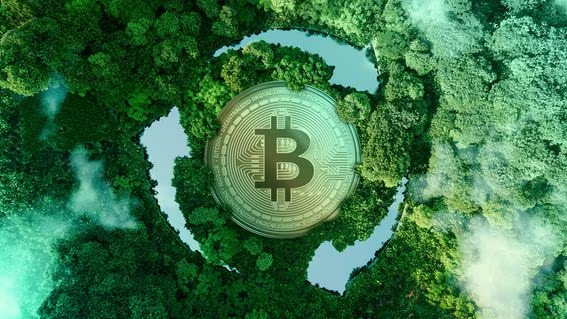Bitcoin and Eco-system : A new age of Digital currency and its Environmental Implications
Bitcoin and Eco-system: A New Age of Digital Currency and its Environmental Implications
Imagine if gold mines were operated by powerful computer systems and complex algorithms, instead of human sweat and machinery. Welcome to the world of Bitcoin and the broader cryptocurrency landscape; a virtual gold mine that's equally revolutionary and controversial. So, let's demystify this!
What is Bitcoin?
First off, what is Bitcoin? Picture it as a massive ledger that records transactions between parties, similar to a traditional banking system. However, instead of being centralized in a single institution, this ledger is decentralized and maintained by thousands of computers worldwide.
What is Cryptocurrency?
And what about cryptocurrency? Well, it's a digital or virtual form of currency that uses cryptography for security. Bitcoin is the first and most famous example, but there are thousands of others. Think of it as a garden, with Bitcoin being the oldest and most prominent tree, while other cryptocurrencies are the younger plants sprouting up.
How Does Bitcoin Work?
Blockchain Technology
A term you'll often hear when discussing Bitcoin and cryptocurrency is Blockchain. This innovative technology is the backbone of Bitcoin. Imagine a chain of blocks, each block storing transaction data. This decentralized ledger is maintained across numerous computers, enhancing security and reliability.
Mining and Transactions
For the transactions to be added to the blockchain, a process known as mining is required. This mining operation involves solving complex mathematical problems, akin to solving a giant puzzle. The "miners" who solve the puzzle get a reward - in Bitcoin. But here's the catch - this process consumes considerable amounts of energy, which segues us into our next topic.
The Bitcoin Ecosystem
Bitcoin Users
Bitcoin users are like the actors in our Bitcoin theatre. They range from casual users who view Bitcoin as a novel investment, to miners who maintain the blockchain, to businesses accepting Bitcoin as a form of payment.
Bitcoin Exchanges
These are the marketplaces where users can buy, sell, or exchange Bitcoins for other digital currencies or traditional currencies like US dollars or Euros. It's like a stock exchange, but for cryptocurrencies.
Bitcoin's Impact on the Environment
Energy Consumption
Here's where the environmental implications of Bitcoin come in. Remember the mining operation we talked about earlier? It requires a vast amount of computational power and electricity, leading to a large carbon footprint. It's like running an endless number of power-hungry factories day and night.
Sustainable Alternatives
Is there a silver lining? Yes! There are more sustainable cryptocurrencies that consume far less energy than Bitcoin. Some have even started to use renewable energy to power their operations, like solar and wind energy, creating an eco-friendlier option in the crypto universe.
Bitcoin and Its Ecological Footprint
The Carbon Footprint of Bitcoin
If we were to compare Bitcoin's energy consumption to countries, it would rank higher than some. This significant energy use translates into a substantial carbon footprint, adding to the pressing issue of climate change. Think of it as adding more cars to an already congested highway.
The Future of Bitcoin and Sustainability
So, what does the future hold? It's uncertain but hopeful. Bitcoin developers and users are continuously exploring more sustainable ways to mine Bitcoin, with a strong focus on renewable energy sources and more energy-efficient algorithms.
Challenges and Opportunities in the Bitcoin Ecosystem
Security and Regulatory Challenges
The decentralization and anonymity of Bitcoin are both its strength and weakness. While it offers freedom from central authority, it also opens doors for illegal activities and regulatory challenges. It's like the wild west, exciting but unpredictable.
The Promise of Decentralization
Despite these challenges, the decentralization offered by Bitcoin presents a world of opportunities. It democratizes financial systems, breaking down traditional barriers and offering an accessible alternative to all. It's akin to giving everyone the key to their own personal bank.
Conclusion
In essence, Bitcoin, as part of the broader cryptocurrency ecosystem, brings both opportunities and challenges. Its environmental impact is a significant concern that necessitates more sustainable solutions. However, the promise of a decentralized financial system continues to drive its evolution. The Bitcoin eco-system is a complex interplay of technology, society, and environment, much like a digital jungle in the vast wilderness of the internet.
FAQs
- What is Bitcoin and how does it work? Bitcoin is a type of cryptocurrency that operates on a technology called blockchain. It's decentralized and maintained by a network of computers worldwide.
- What is the environmental impact of Bitcoin? Bitcoin mining requires a significant amount of energy, leading to a large carbon footprint. However, steps are being taken to make Bitcoin more sustainable.
- What are Bitcoin exchanges? Bitcoin exchanges are online platforms where you can buy, sell, or exchange Bitcoin for other digital or traditional currencies.
- What are the challenges in the Bitcoin ecosystem? The primary challenges include security concerns due to its anonymity and regulatory issues due to its decentralized nature.
- What are the opportunities in the Bitcoin ecosystem? Bitcoin democratizes financial systems, breaking down traditional barriers and offering an accessible alternative to everyone.





댓글
댓글 쓰기